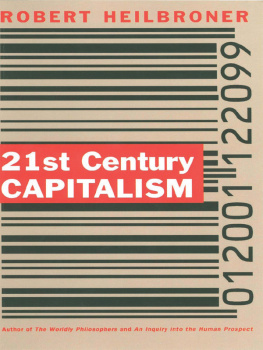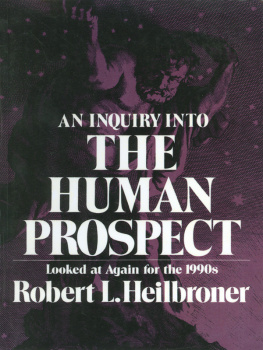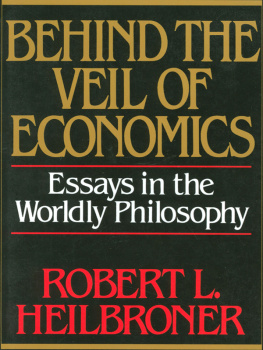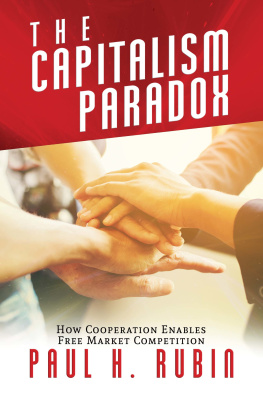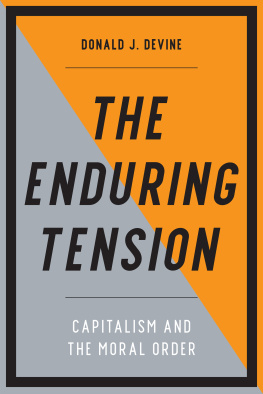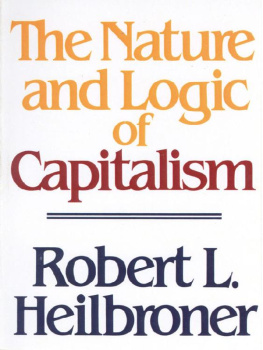
BOOKS BY ROBERT HEILBRONER
Behind the Veil of Economics
The Essential Adam Smith
The Nature and Logic of Capitalism
The Debt and the Deficit
(with Peter Bernstein)
Economics Explained
(with Lester C. Thurow)
Marxism: For and Against
Beyond Boom and Crash
The Economic Transformation of America
(with Aaron Singer)
Business Civilization in Decline
An Inquiry into the Human Prospect
Between Capitalism and Socialism
The Economic Problem
(with James K. Galbraith)
The Limits of American Capitalism
A Primer on Government Spending
(with Peter L. Bernstein)
The Great Ascent
The Making of Economic Society
The Future as History
The Quest for Wealth
The Worldly Philosophers
21st Century Capitalism
Teachings from the Worldly Philosophy
Visions of the Future
The Crisis of Vision in Modern Economic Thought
(with William Milberg)

Copyright 1993 by Robert Heilbroner
All rights reserved
Printed in the United States of America
First published as a Norton paperback 1994
Library of Congress Cataloging-in-Publication Data
Heilbroner, Robert L.
21st century capitalism / Robert Heilbroner.
p. cm.
Includes index.
1. CapitalismUnited States. 2. Twenty-first century.
I. Title.
HB501.H395 1993
330.12'2'0973dc20 93-7662
ISBN: 978-0-393-31228-7
ISBN: 978-0-39324-317-8 (e-book)
W. W. Norton & Company, Inc.
500 Fifth Avenue, New York, N.Y. 10110
www.wwnorton.com
W. W. Norton & Company Ltd.
Castle House, 75/76 Wells Street, London WIT 3QT
For Sammy,
when he gets a little older
Acknowledgments
THESE PAGES ARE based on the Massey Lectures that I was privileged to give in the fall of 1992. Hence my first thanks go to the Canadian Broadcasting Company and to Massey College for their invitation to speak on that distinguished series, and in particular to Bernie Lucht, the executive director of the Ideas program on which the lectures were carried. I am grateful as well to the House of Anansi Press which published the manuscript on which those lectures were based with exemplary speed and skill.
Since then, I have added additional material of a philosophical and historical kind that seemed ill-suited to a series of broadcast talks. That material was presented in a final lecture at Massey College, presided over by Ann Saddlemyer, Master of the College, whose warm support was deeply appreciated. The contents of that lecture, now incorporated into the Introduction and the last chapter, are themselves adaptations of an essay, Historys Lessons, published in the December 1992 issue of Social Research.
Finally, I thank my dear friend Peter L. Bernstein and my much esteemed colleague William Milberg for their warm criticisms, and Donald Lamm for his patience and guidance, and for being my editor and publisher for almost twenty years.
HISTORY TEACHES NOTHING, but only punishes for not learning its lessons. The bitter aphorism, from the late Russian medievalist Vassily Kliuchesky, speaks directly to a generation that has lived through what must be the most instructive century in modern civilization but wonders whether it has grasped its message. History seems to be telling us that the gradient of human progress is imperceptible, perhaps even zero, so that there should be no occasion for dismay in discovering that a hundred years of courage, imagination, and sacrifice have brought us back to Square One. I recall a discussion I had ten years ago with an old friend, an eminent anthropologist, in which we reviewed the hatreds of Hindu and Muslim, Muslim and Jew, Jew and Arab, Irish Protestant and Catholic, white and black, tribe and tribe, and the passions aroused by womens rights. And we thought this was going to be the century of enlightenment! my friend had said. What would he say today, in the light of the aftermath of communism, launched within our lifetimes as an attempt to rewrite the future of humankind; the reappearance of swastikas in Poland and skinheads in East Germany, both thumbing their noses at the victory of World War II; the carnage in Yugoslavia which says as much for World War I; and the spectacle of a triumphant capitalism in the present condition of the United States.
Kliucheskys aphorism strikes directly at any effort to write about the prospects for the immense span of a century. It raises questions whose immensity is matched only by their elusiveness: What is left of the idea of progress in human affairs? Does some form of socialism still lie ahead, as the successor to capitalism? Is human nature at the root of our problems? These are questions I shall address in these pages, but only indirectly and glancingly, until the very end. This is because I believe they are best examined through a focusing lens that scales them down to graspable dimensions and poses them in imaginable contexts. That lens, as the title of this book already makes clear, is the outlook for the social order in which we will live during the coming century.
That is not quite so audacious an undertaking as it sounds. Twenty-first-century capitalism begins in less than a decade, so that at its nearest it is almost at hand. Thereafter it stretches into the future for a hundred yearsa period that we can, however dimly, include within our present concerns, which we could not, were we asked to think about the prospects for capitalismor, for that matter, for humanityin the year 3099. Thus I use the term century to demarcate a future to which we can apply our faculties of reasoned and plausible discourse, from a more distant future to which the only applicable mode of consideration is that of piety or despair. And I use the word capitalismlargely American capitalismbecause it focuses our attention on the great familiar terra incognita within which the twenty-first century will be played out for most of my readers. At any rate, here is where I shall seek not only for whatever clarification we may find with respect to the options and obstacles ahead in our own futures, but for clues as to the lessons that must be learned if humanity is to minimizeit will surely not escapehistorys punishments.
I
THE VERY TITLE 21st Century Capitalism sounds as if I were about to make predictions on a grandiose scale, but to the relief or disappointment of my readers, I must make clear that such is not my intention. In the 1970s I once had occasion to discuss the success of economists in foreseeing large-scale events during the twenty-odd preceding yearsevents such as the advent of the multinational corporation, the rise of Japan as a major economic power, and the emergence of inflation as a chronic problem of all industrial nations. Not a single one of these world-shaking developments had been foretold. More recently, there have been a number of equally important, world-scale happenings, such as the decline in productivity suffered by all the Western powers or the striking loss of global economic leadership of the United States. How presciently were these developments anticipated by the great research institutions that carry on their continuous radar sweep of trends? The answer is that none foresaw them. Finally, there is perhaps the largest economic turning point of modern historythe collapse of the Soviet economy. I do not know of a single economic organization, including those privy to all the secrets of government intelligence services, that expected the debacle.
So I will not be so foolish as to attempt to do that which has foiled so manynamely, to predict the future of the social order in which we live. How, then, can I speak to the theme of twenty-first century capitalism? My answer is that I shall be considering the prospects for capitalism from what might be called a perspective of future-related understanding. As we will see, this is very different from the perspective of prediction. Suppose, for example, that we looked down at the spectrum of todays capitalisms from this new and as yet unexplained vantage point. We would immediately see something that would probably never enter our minds if we were interested in forecasting which countries would be leaders and which laggards in 2025. It is the remarkable fact that although Japanese, Swedes, Americans, Canadians, or for that matter, the French, the Germans, the English, and Italians, do not have the same habits or customs, do not agree about many political means or ends, largely lack a common sense of humor or even of civic duty, they can nonetheless carry on an extremely important, demanding, and complex common task with surprising unanimity of understanding and purpose: they can do business together. That is, they can transact exchanges in the marketplace, negotiate around the bargaining table, or engage in board-room conferences as persons who see at least one aspect of life in much the same way. That aspect concerns the manner in which economic life is organized.
Next page
